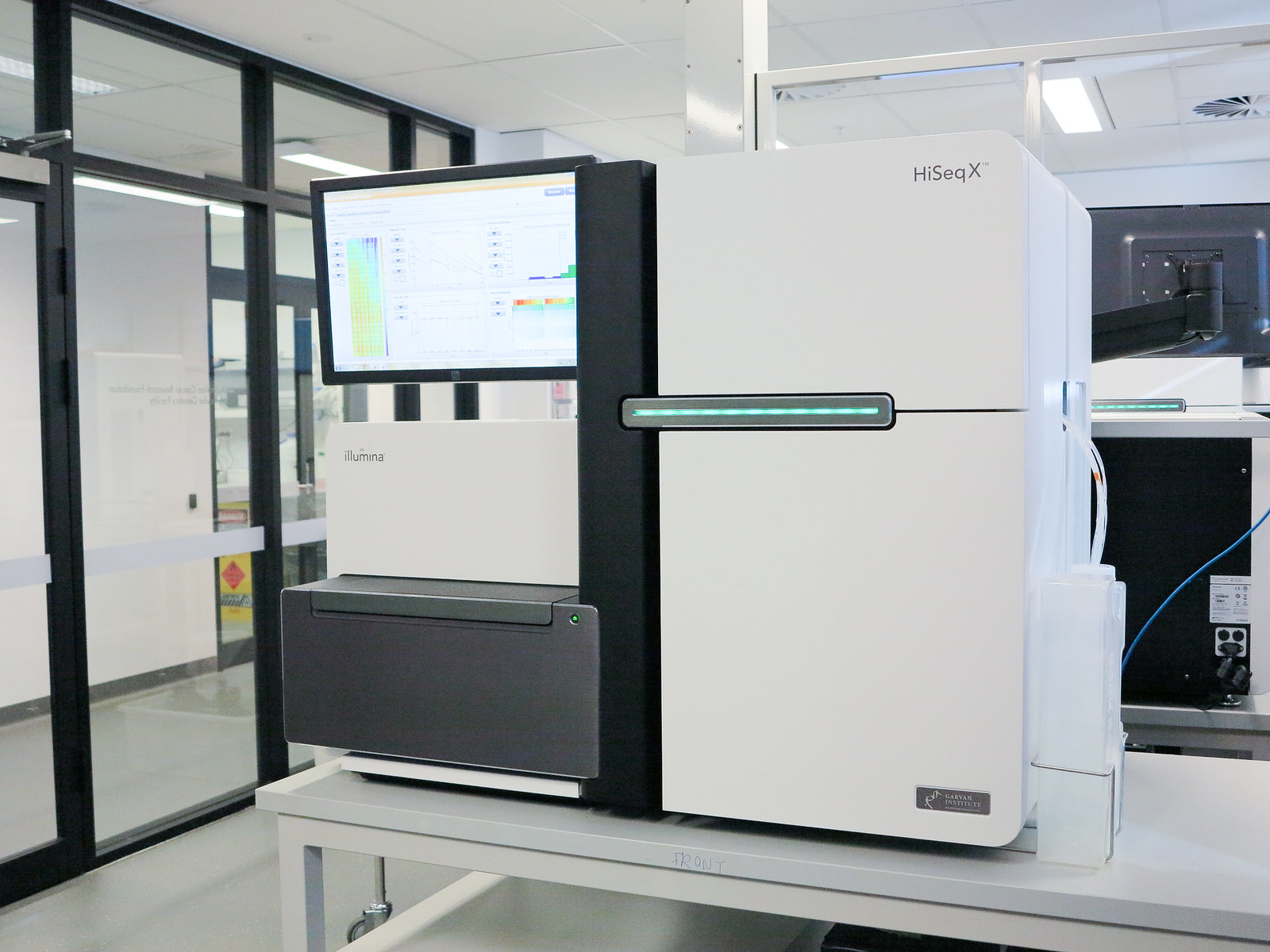
Image provided by Kinghorn Centre for Clinical Genomics
We’re at the time where interest in consumer genotyping is bottoming out. The technology is getting dated and the market is in a lull. But fortunately, Whole Genome Sequencing is getting ready to replace genotyping. And the year 2020 could be the beginning of the end for consumer genotyping companies like 23andMe, AncestryDNA, MyHeritage DNA and others.
As excitement in consumer genotyping fizzles out, Whole Genome Sequencing takes center stage
While excitement in consumer genomic testing (such as 23andMe and Ancestry) is fizzling out, the Whole Genome Sequencing market is expected to surge. 23andMe abandoned its Next Generation Sequencing plans in 2016. And in 2018, 23andMe temporarily put a $749 Whole Genome Sequencing offer on their website to gauge interest for their market research. However, 23andMe’s CEO, Anne Wojcicki, has repeatedly discounted the idea of offering such a service in the near future calling Whole Genome Sequencing a “fancy toy.” In contrast, AncestryDNA has plans to branch out into genetic health screening in 2020 by offering an exome sequencing product. While the exome contains the coding regions of the DNA and is the area of the genome associated with the most disease, it is not the Whole Genome. Not even close.
23andMe and AncestryDNA genotype about 0.02% of your DNA, Whole Exome Sequencing sequences about 1% of your DNA and Whole Genome Sequencing sequences as close to 100% as we can get. While regions outside the exome used to be referred to as “junk DNA,” genetic variants associated with disease are starting to be found in the genome. The genome is also important for ancestry and understanding all the entirety of each chromosome and its abnormalities. And if you are male, there are really cool Y-DNA ancestry tools and services that take advantage of the ancestry data that is derived from the complete sequencing of the Y chromosome.
Here’s a video of 23andMe explaining the difference between genotyping and sequencing in different words:
The future is Whole Genome Sequencing
23andMe and AncestryDNA have discounted their kits for the holidays and 23andMe in particular has done some really cool things to improve their ancestry features (probably because of the market lull). While this may cause a short term increase in sales, I believe the downward market trend in consumer genotyping is inevitable. The market is saturated and I think people want technology and data that’s more than a toy, even if they don’t know it yet.
The consumer genomics market has been looking weak, and it’s a shame that large companies such 23andMe don’t seem to have any plans to offer Whole Genome Sequencing anytime soon. And while it’s cool that AncestryDNA will be offering Exome Sequencing, the future is in Whole Genome Sequencing. And now you can get it for as little as $99 — sort of.
Not all Whole Genome Sequencing is equal and the $99 price point is not near clinical-grade sequencing. Nebula genomics offers a compelling platform with low-pass Whole Genome Sequencing for around $99, but this is only 0.4x sequencing (Nebula no longer offers 0.4x sequencing, but they now offer 30x Whole Genome Sequencing for $299!). This means it only passes through about 40% of your DNA and uses a complex technology called imputation to statistically infer unobserved genotypes. While this is really cool and high tech, the accuracy of these methods are only around 99%, which is worse than consumer genotyping. So while there 50 times more data than genotyping at the expense of accuracy. But the Nebula kit does come with shotgun metagenomics of your oral microbiome, which is pretty neat. According to Nebula, “oral microbiome has been found to change in people suffering from gastrointestinal diseases like inflammatory bowel disease (IBD), systemic diseases like diabetes and even neurological diseases such as Alzheimer’s.”
Incontrast, 30x clinical-grade Whole Genome Sequencing passes through your entire genome approximately 30 times. The accuracy of clinical-grade sequencing can be around 99.99%. Clinical-grade sequencing (30x or higher) has been as low as $189 from Dante Labs. But these sales typically only happen on Black Friday and other occasions.
As we are hitting the $200 price point, it’s time to upgrade! But since not all Whole Genome Sequencing is the same, choosing a trustworthy company can be difficult. And since Whole Genome Sequencing takes a lot of time and computing, results may not come in for many months, even if you choose an established medical sequencing lab. In our next blog post, we’ll go over all the Whole Genome Sequencing companies in depth with all the pros and cons. Until then, we recommend referring to Harvard’s List of Personal Genome Sequencing and Interpretation Services. As startups form and some others inevitably fail, the market players as well as their business models rapidly change. For example, Veritas Genetics, which is still on that list, is not currently conducting business as of this blog post. These kind of things are to be expected as consumers are able to embrace the latest technologies. Welcome to the new era!
Genetic Genie Works with Whole Genome Sequencing
Fortunately, all of Genetic Genie’s tools are now compatible with Whole Genome (including low-pass sequencing) and Whole Exome Sequencing. And for researching known disease-causing variants, there may not be an easier or better tool than the one we recently developed — GenVue Discovery. GenVue Discovery was designed to find a needle in a haystack for classified genetic variants. More features and more GenVue products will be coming out soon.